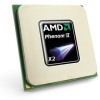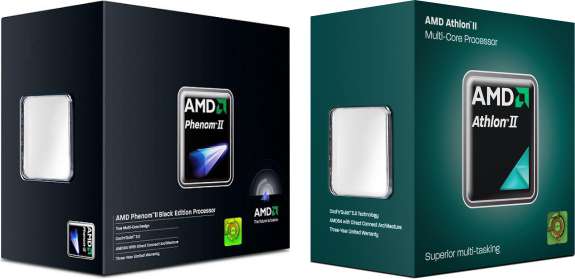- Qualcomm Launches Snapdragon 4 Gen 2 Mobile Platform
- AMD Launches Ryzen PRO 7000 Series Mobile & Desktop Platform
- Intel Launches Sleek Single-Slot Arc Pro A60 Workstation Graphics Card
- NVIDIA Announces Latest Ada Lovelace Additions: GeForce RTX 4060 Ti & RTX 4060
- Maxon Redshift With AMD Radeon GPU Rendering Support Now Available
AMD Athlon II X4 635 & Phenom II X2 555 Black Edition

AMD last month launched five processor models, three Athlon II’s and two Phenom II’s, and we’re taking a look at one of each. The Phenom II is a 3.20GHz dual-core, and a Black Edition dual-core at that, while the Athlon II is the ultra-affordable 2.9GHz quad-core. Let’s see how both stack up to the rest of AMD’s line-up, and the competition.
Page 1 – Introduction
To continue the tradition of offering an incredibly wide selection of value-driven parts, AMD last month added five new models to its line-up, consisting of three Athlon II’s and two Phenom II’s. Some of these parts directly replace others in the line-up, but the company doesn’t make it too clear. Nor is the company’s processor pricing list up-to-date, confusing the situation a bit further.
Of the five models released last month, two are quad-cores, the Athlon II X4 635 and Phenom II X4 910e, two are dual-cores, the Athlon II X2 255 and X2 555 Black Edition, and the other is a tri-core, the Athlon II X3 440. Whew, lots of names and variations being tossed around here. Of all these, AMD’s press release focuses on two, the Phenom II X2 555 BE and Athlon II X4 635, and it’s those same two that we’re focusing on today.
Arguably, the more interesting of these two might be the Propus-based Athlon, as it’s quad-core in nature and retails for around $119. Like the X4 620 we took a look at last fall, the processor offers 2MB of L2 Cache and a 95W TDP. The speed bump from 2.6GHz to 2.9GHz increases the price about $20.
The Deneb-based Phenom is also quite interesting, though, as despite it being only a dual-core offering, AMD has clocked it high, to 3.2GHz, and labeled it a Black Edition model, which means that it offers fast performance right out of the box, and should prove exciting for overclockers. Due to time, we won’t be tackling overclocking, but will focus instead on seeing how they stack up at stock specifications.
|
CPU Name
|
Cores
|
Clock
|
Cache (L2/L3)
|
HT Bus
|
Socket
|
TDP
|
1Ku Price
|
| Phenom II X4 965 BE |
4
|
3.4GHz
|
2+6MB
|
4000MHz
|
AM3
|
140W
|
$245
|
| Phenom II X4 955 BE |
4
|
3.2GHz
|
2+6MB
|
4000MHz
|
AM3
|
125W
|
$245
|
| Phenom II X4 945 |
4
|
3.0GHz
|
2+6MB
|
4000MHz
|
AM3
|
125W
|
$225
|
| Phenom II X4 910e |
4
|
2.6GHz
|
2+6MB
|
4000MHz
|
AM3
|
65W
|
$169
|
| Phenom II X4 905e |
4
|
2.5GHz
|
2+6MB
|
4000MHz
|
AM3
|
65W
|
$175
|
| Phenom II X3 720 BE |
3
|
2.8GHz
|
1.5+6MB
|
4000MHz
|
AM3
|
95W
|
$145
|
| Phenom II X3 705e |
3
|
2.5GHz
|
1.5+6MB
|
4000MHz
|
AM3
|
65W
|
$125
|
| Phenom II X2 555 |
2
|
3.2GHz
|
1+6MB
|
4000MHz
|
AM3
|
80W
|
$99
|
| Phenom II X2 550 |
2
|
3.1GHz
|
1+6MB
|
4000MHz
|
AM3
|
80W
|
$105
|

|
CPU Name
|
Cores
|
Clock
|
Cache (L2/L3)
|
HT Bus
|
Socket
|
TDP
|
1Ku Price
|
| Athlon II X4 635 |
4
|
2.9GHz
|
2MB+0MB
|
4000MHz
|
AM3
|
95W
|
$119
|
| Athlon II X4 630 |
4
|
2.8GHz
|
2MB+0MB
|
4000MHz
|
AM3
|
95W
|
$122
|
| Athlon II X4 620 |
4
|
2.6GHz
|
2MB+0MB
|
4000MHz
|
AM3
|
95W
|
$99
|
| Athlon II X4 605e |
4
|
2.3GHz
|
2MB+0MB
|
4000MHz
|
AM3
|
45W
|
$143
|
| Athlon II X4 600e |
4
|
2.2GHz
|
2MB+0MB
|
4000MHz
|
AM3
|
45W
|
$133
|
| Athlon II X3 440 |
3
|
3.0GHz
|
2MB+0MB
|
4000MHz
|
AM3
|
95W
|
$84
|
| Athlon II X3 435 |
3
|
2.9GHz
|
1.5MB+0MB
|
4000MHz
|
AM3
|
95W
|
$87
|
| Athlon II X3 425 |
3
|
2.7GHz
|
1.5MB+0MB
|
4000MHz
|
AM3
|
95W
|
$76
|
| Athlon II X3 405e |
3
|
2.3GHz
|
1.5MB+0MB
|
4000MHz
|
AM3
|
45W
|
$102
|
| Athlon II X3 400e |
3
|
2.2GHz
|
1.5MB+0MB
|
4000MHz
|
AM3
|
45W
|
$97
|
| Athlon II X2 255 |
2
|
3.1GHz
|
2MB+0MB
|
4000MHz
|
AM3
|
65W
|
$74
|
| Athlon II X2 250 |
2
|
3.0GHz
|
2MB+0MB
|
4000MHz
|
AM3
|
65W
|
$69
|
| Athlon II X2 245 |
2
|
2.9GHz
|
2MB+0MB
|
4000MHz
|
AM3
|
65W
|
$64
|
| Athlon II X2 240 |
2
|
2.8GHz
|
2MB+0MB
|
4000MHz
|
AM3
|
65W
|
$60
|
| Athlon II X2 240e |
2
|
2.8GHz
|
2MB+0MB
|
4000MHz
|
AM3
|
45W
|
$77
|
| Athlon II X2 235e |
2
|
2.7GHz
|
2MB+0MB
|
4000MHz
|
AM3
|
45W
|
$69
|
As the tables above currently show, AMD has an incredible selection of models available. But, as earlier noted, many of these overlap each other in terms of pricing. The Phenom II X2 555 Black Edition, for example, sells for $99 in quantities of 1,000, while the slower X2 550 sells for $6 more. We can assume that some models, like that one, have been dropped from AMD’s inventory. But as the company’s pricing list is out-of-date, it’s hard to know for sure.
At one e-tailer, the X2 555 BE is selling for $4 above the price quoted above, to sit at $104, while the X4 635 is selling for the exact price above, $119. It’s interesting to see both a dual-core and quad-core priced so close to one another, but it’s downright complicated to explain to someone which one is better. After all, it’s not a simple argument of 2 cores vs. 4 cores. One is an Athlon, and the other is a Phenom, which means differing feature-sets
For raw single-threaded performance, the X2 555 at 3.20GHz is going to prove faster than the X4 635 at 2.9GHz. Things will change when multi-threaded tasks are brought in, however, as there’s a clear difference between a process being able to take advantage of 2 or 4 cores in total. But there’s also another factor to keep in mind. The X2 555, as a Phenom II model, includes 1MB of L2 Cache and 6MB of L3. For certain tasks, such as multimedia, having the extra cache will prove beneficial. But, with twice the number of cores, despite the lesser frequency, it’s hard to ignore the total performance capability of the X4 635.
Even without looking at results, the issue of X2 555 vs X4 635 can be answered with the simple question, “Do you use multi-threaded applications?”. If you don’t, or don’t know, chances are fair that you might not properly exploit the potential of an X4 635, and because of this, most of what you do would be accomplished faster with a faster dual-core, such as the X2 555. If you do take advantage of multi-threaded applications, or crave improved multi-tasking capabilities, the X4 635 would prove the better choice, regardless of its Cache densities.
With that said, let’s move right into a look at our testing methodology, and then see where each of these two CPUs stand with our performance results.
Support our efforts! With ad revenue at an all-time low for written websites, we're relying more than ever on reader support to help us continue putting so much effort into this type of content. You can support us by becoming a Patron, or by using our Amazon shopping affiliate links listed through our articles. Thanks for your support!





